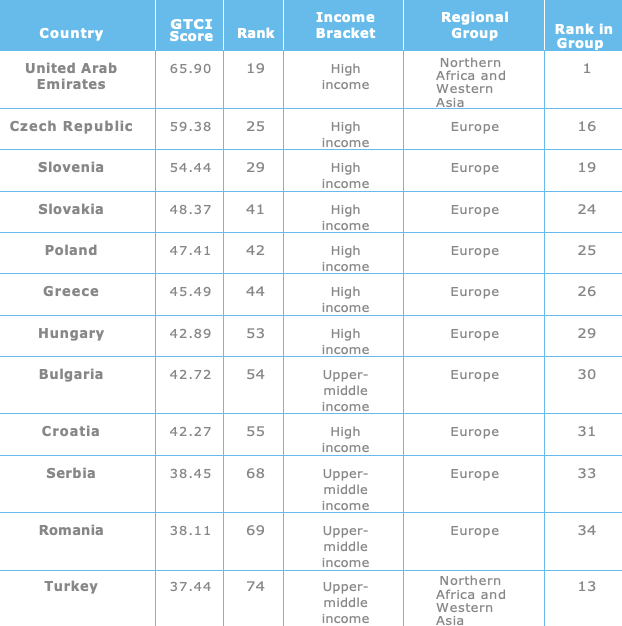Nurturing entrepreneurial talent identified as key to the competitiveness of nations and cities
Entrepreneurial talent has become a key differentiator in relative talent competitiveness
Talent still drawn to small, high-income economies and the United States
Washington, DC is the top performer in the cities’ ranking
Five-year analysis shows talent gap widening between unequal economies
With this sixth edition addressing the theme of Entrepreneurial Talent and Global Competitiveness, GTCI aims to advance the current debate around entrepreneurial talent, providing practical tools and approaches to leverage the full potential of individuals and teams as an engine and a basis for innovation, growth, and ultimately competitiveness. One of the key working assumptions on which this report is based is that entrepreneurial talent cannot be reduced to some innate quality found in successful business founders and leaders. It should rather be regarded as an input to growth, innovation, and employment creation that can be measured and nurtured. There are conditions under which entrepreneurial
talent can thrive and be stimulated. There are others under which it will be stifled, to remain an untapped or wasted resource.
Multiple examples exist around the world of successful ways to generate, grow, attract and retain entrepreneurial talent, from entrepreneurs, from employers and from governments. Such examples deserve due consideration, as well as the ways in which they can be adapted to specific local contexts.
Looking at the region: Central, Eastern Europe, Middle East and North Africa
The report categorizes countries based on geographical location, population and income bracket and out the 86 countries analyzed in depth out of the 125, 42 are high-income countries, 27 are upper-middle-income countries, 16 are lower-middle-income countries, and 1 is a low-income country.
Ranking of GTCI for EEMENA countries:

Please refer to https://gtcistudy.com/ for more information & statistical evidence
UAE Ranks #19 in the 2019 GLOBAL TALENT COMPETITIVENESS INDEX
In GTCI 2019, the United Arab Emirates (UAE) is ranked 19 out of a sample of 125 countries, which means that it makes it into the top quarter. UAE is particularly strong with respect to Attract, where it is one of the top 3 countries by virtue of an impressive level of External Openness (second-highest in the world). It also has strong Vocational and Technical (VT) Skills that can be attributed to a high ability to match labour market demand and workforce supply. The only pillar where the UAE does not feature in the top quarter relates to Global Knowledge (GK) Skills, mainly as a result of a low level of Talent Impact.
Comparison with different groups of countries
The United Arab Emirates is situated in the Northern Africa and Western Asia region and is classified as a high-income country.1 The country is the top performer within its region, ahead of Israel and Qatar. Compared with other regions, it has a higher GTCI score than the top performers of Central and Southern Asia, Latin America and the Caribbean, and Sub-Saharan Africa. It is outranked by both Northern American countries (Canada and the United States) and would find itself in 14th place if it were a European country. Against the countries of the Eastern, Southeastern region and Oceania, it is behind Singapore, New Zealand and Australia.
The UAE is ranked 19th within the group of high-income countries, with 61 percent of countries having lower GTCI scores. It outperforms the highest-ranked country in the other three income groups.

The group of competitors
The United Arab Emirates’ group of competitors is defined as Arab countries from North Africa and Western Asia, in addition to Israel and Turkey.
As can be seen in the figure, the UAE is the top performer within its identified group of competitors. In one sense, this is not surprising, since the UAE has the second- highest GDP per capita and there is a strong correlation between GTCI score and level of income. In another sense, though, it is noteworthy that the UAE scores outranks Qatar, which has a higher GDP per capita, and scores well above Kuwait, which has a similar income level. Similarly, it clearly outperforms both Bahrain and Saudi Arabia in terms of talent competitiveness. The country that comes closest to its GTCI performance is Israel, which is ranked one place behind the UAE.
FUTURE OF SKILLS
A recent study by the Adecco Group and the Boston Consulting Group,2 involving about 4,700 workers in nine countries, showed that 62% of respondents saw them- selves as primarily responsible for acquiring new skills. There are some areas, such as technology, where change is moving so fast that it is hard for our workforces to keep up. Take the example of automation.
This breakthrough in science has replaced or reshaped many traditional manufacturing and services roles.
As automation has replaced the demand for certain hard skills in the workplace, the demand for soft, transferable, flexible skills has also grown. These are the skills of the future: problem solving & criti- cal thinking, leadership & people management, and crea- tivity & communication.
Unfortunately, these valuable skills are often learned outside of the classroom because school curricula have failed to keep up with the pace of change. It is vital that these skills become part of a standard education, driven by close interaction with the business world
Our future skilling study with the Boston Consulting Group found that two-thirds of employees anticipate that their job will change significantly every five years because of technological advancement. Most employees are concerned about the impact of change and what it will mean for their job security.
It is clear that we need to find solutions that enable our workers to re- or up-skill on multiple occasions through their lives. This must become a core policy for companies and a central pillar of our social systems – a lifelong learning account as part of social protection schemes would be ideal.
As the world changes, so must we. The successful worker of tomorrow will be an entrepreneur in his or her own personal development, geared for lifelong learning with the right kind of skills.
Some are already getting the message: while our future skilling study found that only 39% of total respondents had acquired digital skills, that figure rose to 57% of participants in China and 63% in India.
The successful businesses of tomorrow will be flexible and adaptable to change, reimagining ways to manage their workforce needs and investing in the skills of their workers as standard. Crucially, our future skilling survey found that 77% of respondents took the training policies of a future employer into account when considering a new job. Employers take note!
The visionary governments of tomorrow will redesign traditional education systems to focus just as much on soft skills as on hard skills and academic knowledge.
They will facilitate lifelong learning and establish social protection schemes such as education accounts that allow individuals to contribute to the cost of their own up- and re-skilling. And the HR industry will help shape the future of work, with cutting-edge services such as those offered by Lee Hecht Harrison and GA.
To read the GTCI in its entirety and to find out which country/city works best for you click here!

